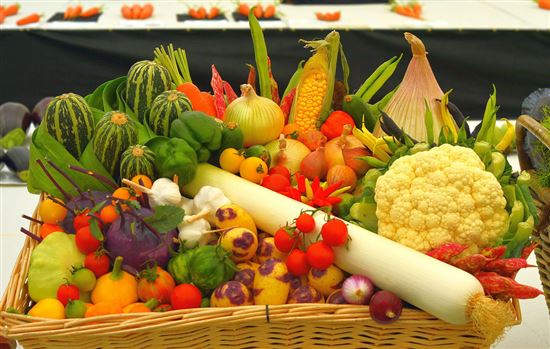23 Thought-Provoking Vegetarian Statistics
How many Americans are vegetarians? 1 in 20. Check out these 23 thought provoking facts and health statistics on vegetarianism.
 |
| © Micolo J (CC BY 2.0) via Flickr |
Although meat is a big part of most Americans' diets, a select few prefer a diet that's heavy on the vegetables. If you're able to let go of your cravings for juicy steaks and pepperoni pizza, becoming a vegetarian can yield some interesting benefits (both health-wise and financially) when you're not spending big bucks on meat at the grocery store each week.
There are four specific kinds of vegetarian diets you can follow, and some are stricter than others in terms of what you can and can't eat. Veganism, an offshoot of vegetarianism, involves avoiding eating animal products of any kind, including eggs and dairy. If you always listen to your mother's advice and eat all your vegetables, you probably know what the benefits of cutting back on the cheeseburgers are. If not, here's a look at some inspiring statistics on vegetarianism that might just encourage you to clean your plate.
GAUGING INTEREST IN VEGETARIANISM
Vegetarianism is a lifestyle choice that's not necessarily right for everyone. To get our study started, we zeroed in on the number of people who claim to be vegetarian. We also looked at how widespread interest is in choosing a meatless diet.
1. How many Americans are vegetarians?
Around 5% of the total U.S. population claims to follow a vegetarian routine, which comes out to about 16 million people nationwide.
2. How many Americans eat a vegetable-inclined diet?
An estimated 33% of Americans, or about 109 million people, say they follow a diet that leans heavily towards fresh vegetables with meat thrown in occasionally.
3. How many people have tried vegetarianism?
Although the number of people who currently practice vegetarianism is fairly low, an estimated 30 million Americans have tried it at one time or another.
4. How many say they're interested in trying it?
While they haven't pulled the trigger yet, close to 12 million Americans say they'd be interested in giving vegetarianism a go.
5. How many Americans are vegan?
Although some may feel it's too restrictive, veganism continues to spread and around 7.5 million people in the U.S. don't consume any animal products at all.
6. How many people are long-term vegetarians?
The majority of vegetarians, approximately 57% , have been following their current dietary routine for 10 years or more. Eighteen percent have been vegetarian for 5 to 10 years.
7. Are men or women more likely to identify as vegetarian?
Women have a slight edge when it comes to vegetarianism, with 59% choosing a vegetable-based diet compared to 41% of men.
8. Are more vegetarians married or single?
The odds of being a vegetarian increase if you haven't tied the knot. About 8% of singles say they go veggie-only, compared to 3% of married men and women.
VEGETARIANS BY AGE
The decision to become a vegetarian can be made at any age but based on the numbers we found, the trend seems to be more popular with certain adults than others.
9. How old is the average vegetarian?
Among current vegetarians, the average age is a robust 42 . The average age for former vegetarians is slightly higher at 48.
10. How many kids are veggie-lovers?
Getting kids to eat their vegetables can be a challenge. There are, however, about 2 million kids aged 8 to 18 who call themselves vegetarian. Around 15 million kids say they eat a vegetarian meal at least once a week.
11. How many kids go the vegan route?
Veganism is less common among every age group but there are still about 500,000 kids who say no to animal products of any kind.
12. How many young adults are vegetarian?
Vegetarianism is something that people tend to pick up on when they're young, and it's especially popular among millennials. Around 42% of those who adhere to a vegetarian diet are between the ages of 18 to 34.
13. How many are middle-aged?
Not to be outdone, those in the 35- to 54-age range represent about 41% of all vegetarians.
14. How many are seniors?
Older Americans are also getting in on the action, with 17% of those over age 55 loading up their plates with vegetables.
VEGETARIANISM AND HEALTH
A diet that's heavy in red meat has been linked to an increase risk of heart problems and other illnesses. Research shows that swapping some of your weekly servings for veggies instead may prove to be beneficial for your physical well-being.
15. What's the top reason people choose vegetarianism?
Improving health is the reason some 58% of people choose to become vegetarians in the first place. Concern about animal welfare is the motivating factor for a lifestyle change among 27% of veggie-philes.
16. Does vegetarianism reduce cancer risk?
Numerous studies have attempted to link an all-vegetable diet to a reduced risk for cancer, and at least one suggests that vegetarians are 10 to 12% less likely to develop the disease.
17. Do vegetarians have better mortality rates?
Aside from reducing your cancer risk, eating vegetables may just help you to live a little longer. In one study, adult vegetarians saw their mortality rate decrease by 12% .
18. How does their heart health compare?
Eating red meat can raise cholesterol levels, which can potentially contribute to heart disease. Research shows that a vegetarian diet can reduce your risk by more than 30%.
19. How many vegetarians go back to eating meat?
Sticking to a vegetarian diet can be tough, especially if you're a big fan of cheeseburgers and steak. Perhaps unsurprisingly, 84% of vegetarians and vegans eventually resume their carnivorous ways.
VEGETARIANISM AND THE ENVIRONMENT
Being conscious of where the food we eat comes from can be a real eye-opener, especially when you're confronted with the damage that farming can do the environment. The final factor we considered was how eco-friendly vegetarianism is compared to a meat-centric diet.
20. How much water does a vegetarian diet save?
Raising livestock for food requires a significant amount of water; it takes about 2,400 gallons to produce one pound of meat. By comparison, it takes just 25 gallons to produce a pound of wheat.
21. Does vegetarianism reduce greenhouse gases?
Greenhouse gases are believed to be a major contributor to global warming. Research shows that the production of meat products for consumption produces double the amount of emissions than growing vegetables produces.
22. How many animals does vegetarianism save?
Going vegetarian isn't just good for the environment; it also helps the world's animal population. It's estimated that eating a vegetarian diet saves about 400 animals per year from slaughter.
23. Can vegetarianism cut down on deforestation?
Farmland is a valuable commodity for livestock producers, and as much as 6 million hectares of forestland are converted to cattle-grazing fields each year. That's about 30% of the world's land that's sacrificed for animal agriculture.
CONCLUSION
Going vegetarian can be difficult to get used initially. For those who are able to stick with it, though, there are some tangible rewards to be had. If you can't stomach the idea of swearing off meat forever, you could still see a big payoff just by cutting back on the amount you eat at mealtimes.
Sources and References:
Rebecca Lake is a journalist at CreditDonkey, a credit card comparison and reviews website. Write to Rebecca Lake at rebecca@creditdonkey.com. Follow us on Twitter and Facebook for our latest posts.
Note: This website is made possible through financial relationships with some of the products and services mentioned on this site. We may receive compensation if you shop through links in our content. You do not have to use our links, but you help support CreditDonkey if you do.
Read Next:





